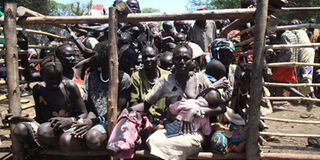Fighting rages in S. Sudan as rebels attack two army bases

PHOTO | AFP Newly arrived South Sudanese refugees wait to register at the Pagak Border Entry point in the Gambella Region, Ethiopia. Conflict in South Sudan, triggering a large refugee influx into Ethiopia began in mid-December when South Sudanese President Salva Kiir accused senior politicians loyal to former Vice President Riek Machar of staging a coup.
What you need to know:
- Country descended into conflict after a December 15 failed coup blamed on ex-VP
- Rebel forces launched an assault on Kaka and Wodikana on Wednesday, violating a ceasefire the international community has been pressing both sides to observe.
JUBA
Fresh fighting has broken out between government troops and rebel forces over the control of two strategic localities near Malakal, the capital of the oil-rich Upper Nile State, officials have said.
Rebel forces launched an assault on Kaka and Wodikana on Wednesday, violating a ceasefire the international community has been pressing both sides to observe.
“The rebel forces attacked SPLA positions in the morning in Kaka and Wodikona and the fighting went on in both areas,” said military spokesman Col Philip Aguer.
“The civilians were on the run as the SPLA engaged the rebel forces. We have no any details of what is on the ground now,” he said.
Rebel spokesman Lul Ruai told a UN radio that his forces had previously chased out government troops and seized control of Kaka but denied his forces renewed the attack.
“This place called Kaka Tijariya was liberated by our forces nearly three weeks ago, so if there is any fighting in Kaka Tijaria then it must be the government forces who are trying to recapture it from our forces,” Mr Lul told Radio Miraya.
“Regarding clashes in Wodikona I have no information because I am yet to get in touch with the field commanders in that area,” he said.
South Sudan descended into conflict after a December 15 failed coup blamed on former Vice President turned rebel leader Dr Riek Machar Teny.
United States President Barack Obama signed an executive order last week to pave way for sanctions on individuals obstructing the peace process, attacking United Nations peacekeepers and complicit in the abuse and violations of human rights.
Meanwhile, the United Nations yesterday hit back at criticism of its mission in South Sudan after a leading international aid agency accused it of “shocking indifference” towards thousands of displaced people living in squalor. Medecins Sans Frontieres (Doctors Without Borders) launched a stinging attack on UN officials in the country, accusing them of leaving terrified civilians in a section of camp acknowledged as a “death trap” because of its potential exposure to diseases.
“We are doing our best to decongest the site and encourage people to move voluntarily to better sites with better sanitation,” UN spokesman Stephane Dujarric said.
“It is a huge logistical challenge to take care of these thousands of people.”
MSF said earlier some 21,000 people had been left in a flood-prone part of a UN Mission in South Sudan (UNMISS) base “exposed to waterborne diseases and potential epidemics.”
Nick Birnback, spokesman for the UN Department of Peacekeeping Operations, rejected the MSF criticisms of UN officials in South Sudan.
“I strongly disagree with the assertions made by MSF against UNMISS and these views are not necessarily shared by the rest of the humanitarian community,” Mr Birnback.
“There has been no change in the level of humanitarian assistance being provided,” he said. The UN was keenly aware of the risks of epidemics and overcrowding, he added.
“De-congestion of overpopulated sites and cleaning up of areas posing an epidemic risk are essential and remain the basis of all efforts UNMISS is undertaking,” he said.
Around 1,500 civilians had moved voluntarily from the area of the Tomping base in Juba posing the greatest of health risks.





